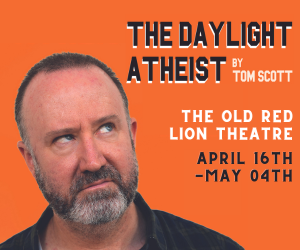What's real, what's imagined and what's the cause - or effect - of madness are the questions most of us know to be raised but rarely consistently answered in Shakespeare's most (accidentally) quoted, widely adapted, bum-achingly longest of plays. Robert Icke's production adds a modern veneer to these questions with key moments of revelation being communicated through technology - here, news screens show the funerals and wars, security cameras track King Hamlet's ghost and bugs and earpieces replace eavesdropping.
Overall this is a Hamlet that is worth seeing if you haven't already got many on your theatrical CV.
The subject of ‘fake news’ clearly resonates right now to the question of what and who we can trust, but strip away the sense of modernity that multiple TV screens bring to the stage and what you actually have here is a very simple, timeless - even setless - production thats power is in its intimacy and relies on the strength of each nuance of performance. And for the most part this air of barely controlled stillness is enthrallingly hypnotic and befits Andrew Scott's Hamlet perfectly.
From the opening 'ghost scene' played in a security booth with the mysterious figure suddenly appearing on one of the many screens - giving a proper modern jump-out-your-seat moment - to the decadence of the upstage screened off ballroom of Elsinore, Hildegard Bechtler's design cleverly puts you at ease with these recognisable signifiers of our times.
But look behind these adornments, and you realise that the main stage is a rarely used (for the Almeida) basic pros arch with sparse features that subtly get stripped away as the tragedy unfolds so it really becomes nothing more than an 'empty space'. You just don't consciously register it as the quietness of the performances absorbs your focus. Words are barely but precisely delivered - much as to the directorial notes Hamlet gives to the Players of his guilt revealing play - creating a silence throughout the theatre that is absorbing and at times chilling.
This insular quietness is the key to Scott's Hamlet and feels that the rest of the play has been built around him. There are clear - if obvious - comparisons to his Moriarty on display with similar demonstrations of possible madness; most notably a comfort with sarcasm and a sardonic, knowing wit (at times you may be surprised to laugh out loud during some of the famed tragic soliloquies). The 'crazed frenetic' Hamlet appears little – and when it does, something of his tone and timbre render this close to screeching – for this is a man being eaten up by frustration and confusion at all around him.
You can sense his mind and body are full of questions that can't be answered and he seems to be trying to scratch out the truth from underneath his skin as he constantly claws at himself to get to the depth of his soul. His control of every word, whilst visibly looking for release, puts him at the precipice of explosion whilst rarely allowing himself to go over the edge. In the times that the cork does come off – such as in his fight with his mother – the impact is less successful than the expectation.
Such subtleties continue to be effective with Peter Wight's Polonius seemingly an interfering bumbler of a man but with the odd touch of the head or slightly too long pause that imply all is not well with his stability. And whilst Juliet Stevenson's Gertrude displays her affection for Claudius as physically sexual rather than emotionally deep, she has a clear regal air and understated but obvious love for her son - though as she comes to take his side, this understatedness leads to a delivery so quiet as to be at times indeterminable.
Bigger performances stand out as unnatural within this – with Angus Wright bringing the same droning delivery to Claudius as he did to Big Brother in Icke's production of 1984. Some may find it powerful in its stoicism but I find it unemotional and monotone. And would someone please find him a pair of trousers that fit – so many of his speeches are introduced by him shifting his belt and pulling them up above his waist as to be distractingly amusing. A small thing but magnified here when such small things are there to be so closely examined.
Overall this is a Hamlet that is worth seeing if you haven't already got many on your theatrical CV. It's accessible and with few frills (other than the technology which works well both analogously and visually) and focuses so much on the acting that it leaves no room for average and so manages to keep you enthralled for (most of) the four hour run. You don't even really need the second interval which may seem surprising in our day of the short attention span. I'm not sure it will go down as a 'Hamlet Best' but Scott makes for a very amiable and watchable Dane that is definitely worthwhile.









